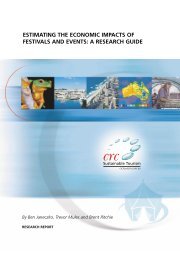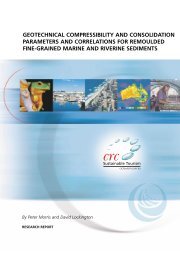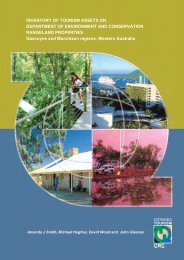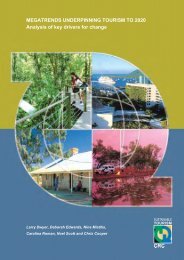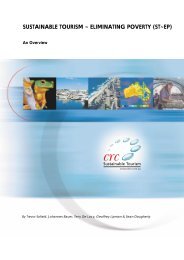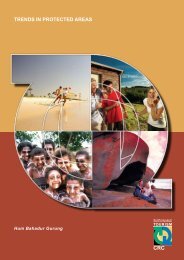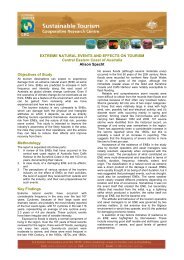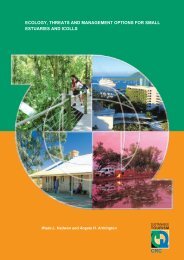the travel agency service industry - Sustainable Tourism CRC
the travel agency service industry - Sustainable Tourism CRC
the travel agency service industry - Sustainable Tourism CRC
Create successful ePaper yourself
Turn your PDF publications into a flip-book with our unique Google optimized e-Paper software.
THE TRAVEL AGENCY SERVICE INDUSTRY:<br />
INDUSTRY TRENDS AND PRACTICES<br />
Introduction<br />
Sue Bergin-Seers 1<br />
, Barry O’Mahony 2<br />
and Regina Quiazon 3<br />
The need for this scoping study was identified by <strong>the</strong> Australian Federation of Travel Agents<br />
(AFTA). A current overview of <strong>the</strong> <strong>industry</strong>, including <strong>the</strong> changing trends of <strong>travel</strong>lers, was<br />
required by <strong>the</strong> organisation, with a specific request to source existing available data with<br />
regard to <strong>industry</strong> trends for <strong>travel</strong>lers in seeking, booking and purchasing <strong>travel</strong>. It was<br />
understood from <strong>the</strong> outset that data may not exist to answer all <strong>the</strong> desired needs and, hence,<br />
<strong>the</strong> scoping study would help to confirm <strong>the</strong> need for future primary research, as well as <strong>the</strong><br />
parameters and dimensions of that research. This paper describes <strong>the</strong> key findings of <strong>the</strong><br />
scoping phase.<br />
In identifying <strong>the</strong> current trends and practices in <strong>the</strong> Travel Agency Service Industry, <strong>the</strong><br />
research was based on secondary data to specifically consider <strong>the</strong> following issues, as<br />
identified by AFTA:<br />
• Travel <strong>agency</strong> reservations and bookings as compared to reservations and bookings<br />
conducted over <strong>the</strong> internet;<br />
• Use of <strong>the</strong> internet for information sourcing for <strong>travel</strong> decision making as opposed to<br />
advice from <strong>travel</strong> agents;<br />
• Variations in usage of <strong>the</strong> internet versus <strong>travel</strong> agents according to market segment<br />
and length of stay;<br />
• Direct selling by airlines;<br />
• Reasons for <strong>travel</strong>ler use of <strong>the</strong> internet; and<br />
• Best practice competitive strategies by key <strong>travel</strong> agents.<br />
Data Sources and Limitations<br />
The data for <strong>the</strong> study were drawn from a number of sources, including IbisWorld, <strong>Tourism</strong><br />
Australia, Roy Morgan, AC Nielsen, Australian Bureau of Statistics, <strong>Sustainable</strong> <strong>Tourism</strong> Cooperative<br />
Research Centre (ST<strong>CRC</strong>) and various media sources. It should be noted that <strong>the</strong><br />
IbisWorld (2005) data was used extensively as it provided regular updates on <strong>the</strong> <strong>travel</strong> agent<br />
<strong>industry</strong>. The wide-ranging data provided by IbisWorld were carefully examined in order to<br />
select and analyse relevant information for this report; however, numerous calls to <strong>the</strong>ir<br />
research personnel were required to clarify conflicting information. Gaps in <strong>the</strong> IbisWorld<br />
data were filled by o<strong>the</strong>r sources (some of which are dated). Additionally, primary analysis of<br />
<strong>Tourism</strong> Australia’s (2004a) international visitor survey (IVS) base data provided in CDMota<br />
format was undertaken to address <strong>the</strong> consumer-related research questions.<br />
1<br />
Research Fellow, Centre for Hospitality and <strong>Tourism</strong> Research, Victoria University. Email: sue.bergin@vu.edu.au<br />
2<br />
Director, Centre for Hospitality and <strong>Tourism</strong> Research, Victoria University. Email: barry.omahony@vu.edu.au<br />
3<br />
Research Officer, Centre for Hospitality and <strong>Tourism</strong> Research, Victoria University. Email:<br />
regina.quiazon@vu.edu.au<br />
1
Findings<br />
The Overall Market<br />
The overall market with regard to <strong>the</strong> Travel Agency Service Industry in Australia includes<br />
direct selling by <strong>travel</strong> agencies (retailers and wholesalers), online <strong>travel</strong> agencies, online<br />
wholesalers/consolidators, airlines, tour operators and o<strong>the</strong>r ground content (accommodation,<br />
attractions, event and show tickets, car hire etc.) operators. Internet <strong>travel</strong> reservations and<br />
bookings include transport (plane, ship, rental cars etc.), accommodation (hotels, motels,<br />
<strong>service</strong>d apartments etc.), tourist attractions (<strong>the</strong>me, amusement parks, museums etc.) and<br />
bookings made for business, personal and/or leisure purposes (IbisWorld 2005). It was <strong>the</strong><br />
intention in this study that internet <strong>travel</strong> reservations and bookings would exclude <strong>travel</strong><br />
agent websites; however, <strong>the</strong> secondary research drawn on did not always clarify whe<strong>the</strong>r<br />
usage of <strong>the</strong> internet excluded <strong>travel</strong> agent sites or not.<br />
As shown in Table 1, <strong>the</strong> number of enterprises operating in <strong>the</strong> Australian <strong>industry</strong> has<br />
decreased from 3,174 in 2000-2001 to 2,968 in 2004-2005. This decrease indicates that<br />
consolidation is occurring. In fact, significant <strong>industry</strong> consolidation has occurred recently, to<br />
<strong>the</strong> extent that <strong>the</strong>re are four major operators. These operators, who are shop front franchised<br />
retailers include Flight Centre, Jetwet Travelworld, Harvey World Travel and Travelscene<br />
(which has completed a joint franchising arrangement with American Express). Beyond this<br />
<strong>the</strong>re are a few smaller brands and some independent operators, but <strong>the</strong> <strong>industry</strong> is now<br />
dominated by <strong>the</strong>se major operators.<br />
2<br />
Table 1: Key market statistics<br />
2000-2001 2001-2002 2002-2003 2003-2004 2004-2005<br />
Industry Revenue ($mill) *2,614.0 *2,352.0 *2,290.0 *2,315.0 *2,338.0<br />
Industry Gross Product ($mill) *932.0 *828.0 *780.0 *808.0 *816.0<br />
Number of Establishments<br />
(units)<br />
*3,976.0 *3,857.0 *3,780.0 *3,742.0 *3,723.0<br />
Number of Enterprises (units) *3,174.0 *3,079.0 *3,017.0 *2,986.0 *2,968.0<br />
Employment (units) *23,368.0 *22,550.0 *22,100.0 *21,879.0 *21,660.0<br />
Exports ($mill) *231.0 *219.0 *214.0 *250.0 *279.0<br />
Imports ($mill) *471.0 *468.0 *463.0 *523.0 *571.0<br />
Total Wages ($mill) *728.0 *726.0 *706.0 *686.0 *679.0<br />
Domestic Demand ($mill) *2,854.0 *2,601.0 *2,539.0 *2,588.0 *2,630.0<br />
Source: IbisWorld 2005<br />
* Constant prices<br />
Based on <strong>the</strong> reported consolidated revenues for 2004-05, three of <strong>the</strong> top four companies<br />
were estimated to account for over 40 % of total revenue, as listed in Table 2. The major<br />
retailers compete with airlines and o<strong>the</strong>r ground operators through web-based information,<br />
reservation and bookings.
Table 2: Market share<br />
Agency Market share range<br />
Flight Centre Ltd 34%<br />
Jetset Travelworld Ltd 6%<br />
Harvey World Travel 3%<br />
Figures are based on company reports of annual<br />
revenues and <strong>industry</strong> revenue of $2338 million.<br />
With approximately 34% of <strong>the</strong> market share, Flight Centre dominates <strong>the</strong> <strong>travel</strong> <strong>agency</strong><br />
<strong>industry</strong>. The closest rivals to Flight Centre are Jetset Travelworld and Harvey World Travel.<br />
Travelscene is also a key competitor, but revenue figures are not currently available.<br />
The total Travel Agency Service Industry revenue for <strong>the</strong> year ending November 2005 was<br />
$2338 million which represents an estimated real growth of 1% from <strong>the</strong> previous year. The<br />
total revenue is derived from three components: Australians <strong>travel</strong>ling overseas (imports);<br />
international visitors <strong>travel</strong>ling to Australia (exports); and Australians <strong>travel</strong>ling within<br />
Australia (domestic). Imports are estimated at $571 million and exports at $279 million<br />
(IbisWorld 2005).<br />
Within this product segmentation, <strong>the</strong> <strong>industry</strong> is broken down into four <strong>service</strong><br />
components, as shown in Table 3. As indicated, <strong>the</strong> retailers account for nearly 50% of <strong>the</strong><br />
total revenue.<br />
Table 3: Industry <strong>service</strong> components and market share<br />
Service Share of total revenue<br />
Retailers less than 50% (2003-04)<br />
Tour Wholesalers/Consolidators 30%<br />
Inbound Tour Operators Over 20%<br />
Tourist Bureaux less than 1%<br />
Source: IbisWorld 2005<br />
Industry Market Share: <strong>the</strong> Internet Compared to <strong>the</strong> Overall Market<br />
In 2005, direct bookings by Australian <strong>travel</strong>lers with <strong>travel</strong> providers continued to be <strong>the</strong><br />
most popular method of booking a trip and are double that of <strong>travel</strong> agents (see Figure 1).<br />
Additionally, for <strong>the</strong> three-year period from 2003 to 2005, Internet bookings increased from<br />
17% to over 28%, airline bookings increased from 12% to 15% and <strong>travel</strong> agent bookings<br />
remained stable.<br />
These trends suggest that <strong>the</strong>re is no major shift in <strong>the</strong> sale of <strong>travel</strong> by <strong>travel</strong> agents over<br />
<strong>the</strong> past three years, despite <strong>the</strong> increase in internet bookings. These findings may indicate<br />
that some consumers are using both providers in a complementary way and may not<br />
necessarily be choosing between <strong>the</strong> two.<br />
3
4<br />
60%<br />
50%<br />
40%<br />
30%<br />
20%<br />
10%<br />
0%<br />
52%<br />
50% 50%<br />
Booked directly with<br />
provider<br />
17%<br />
23%<br />
28%<br />
24% 24% 25%<br />
14% 15%<br />
12%<br />
Figure 1: Top six <strong>service</strong> providers where last trip was booked<br />
2% 2% 2% 2% 2% 2%<br />
Internet Travel agent Airline Tour operator State <strong>Tourism</strong><br />
Authority/Government<br />
Travel Centre<br />
Jun-03 Jun-04 Jun-05<br />
Source: Roy Morgan 2005<br />
Base: Respondents who booked <strong>the</strong>ir last trip (excludes those who were unsure about <strong>the</strong>ir booking method)<br />
Market Share: <strong>the</strong> Internet Compared to Travel Agents<br />
Technological developments regarding <strong>travel</strong> purchases have affected <strong>the</strong> <strong>industry</strong><br />
dramatically. Direct bookings and reservations by <strong>travel</strong>lers via <strong>the</strong> internet, using specialist<br />
software and GDS sites have increased <strong>the</strong> opportunities to book both <strong>travel</strong> and<br />
accommodation. Internet booking by <strong>travel</strong>lers has grown and will most likely continue to<br />
grow with <strong>the</strong> spread of o<strong>the</strong>r technologies, such as <strong>the</strong> optical fibre network, online visual<br />
presentations of <strong>travel</strong> product and CD-ROMs. Fur<strong>the</strong>rmore, ticket-less <strong>travel</strong> using smart<br />
(computer chip imbedded) credit cards or e-tickets is also a key factor influencing electronicbased<br />
purchasing by <strong>travel</strong>lers (IbisWorld 2005).<br />
Research suggests that, with <strong>the</strong> growth of online <strong>travel</strong> bookings, <strong>the</strong> internet, in certain<br />
situations, is now almost equal with <strong>travel</strong> agents as <strong>the</strong> most preferred means of booking<br />
<strong>travel</strong>. This trend is not surprising given that Australia has one of <strong>the</strong> world’s highest<br />
incidences of consumer purchases on line (Roy Morgan 2004).<br />
The internet also plays an important role as a low-cost and efficient means of sourcing<br />
information about <strong>travel</strong> and <strong>travel</strong> destinations and is used to help <strong>travel</strong>lers in <strong>the</strong>ir <strong>travel</strong><br />
decision-making. As a result, in particular circumstances <strong>the</strong> internet is taking <strong>the</strong> place of <strong>the</strong><br />
<strong>travel</strong> agent. However, <strong>the</strong> usage of <strong>the</strong> internet (although growing) is not overtaking all<br />
aspects of <strong>travel</strong>. The use of <strong>the</strong> internet for bookings and sourcing information varies<br />
according to ‘type of trip’ and market segment. Additionally, best practice by <strong>the</strong> leading<br />
<strong>travel</strong> agents suggests it is feasible for agents to compete with <strong>the</strong> internet. Strategies for how<br />
this has been achieved are discussed in a later section of this paper.<br />
In summary, and as detailed fur<strong>the</strong>r, <strong>the</strong> market share for <strong>travel</strong> booking for <strong>travel</strong> agents<br />
compared to <strong>the</strong> internet is as follows:<br />
• For domestic <strong>travel</strong> (including both short and long trips), <strong>the</strong> internet has overtaken<br />
bookings with <strong>travel</strong> agents;<br />
• For international long-trip <strong>travel</strong> (three or more days) by Australians, <strong>travel</strong> agents are<br />
still <strong>the</strong> preferred booking mode (60% for agents compared to 23% via <strong>the</strong> internet);<br />
and<br />
• For international visitors to Australia, <strong>the</strong>re is a growing trend to book <strong>travel</strong> via <strong>the</strong><br />
internet (grown from 7% to 18% from 2001 to 2004).
With regard to <strong>the</strong> market share for <strong>the</strong> sourcing of <strong>travel</strong> related information <strong>the</strong> following<br />
trends have been observed:<br />
• For domestic <strong>travel</strong>, <strong>the</strong> use of <strong>the</strong> internet is slightly more than for <strong>travel</strong> agents; and<br />
• For international visitors, <strong>the</strong> internet has overtaken <strong>travel</strong> agents as a source of<br />
information to support consumer destination choice.<br />
Industry Trends<br />
The two issues explored in relation to <strong>industry</strong> trends are concerned with how <strong>the</strong> internet is<br />
impacting on Travel Agency Services. These issues include current booking patterns and<br />
information sourcing by <strong>travel</strong>lers for decision-making. These trends vary according to length<br />
of stay as well as market segment.<br />
Booking Patterns<br />
The market segments explored in relation to booking patterns include Australians <strong>travel</strong>ling<br />
domestically, Australians <strong>travel</strong>ling overseas and international visitors <strong>travel</strong>ling to and within<br />
Australia. International <strong>travel</strong> by Australians contributes significantly to <strong>the</strong> <strong>industry</strong>, as it is<br />
estimated to account for around two-thirds of <strong>the</strong> <strong>industry</strong> total revenue, as summarised in<br />
Table 4.<br />
Table 4: Contribution to <strong>industry</strong> total revenue by market segment<br />
Product/<strong>service</strong>s<br />
Contribution to <strong>industry</strong><br />
total revenue<br />
International <strong>travel</strong> by Australians 65.0%<br />
International visitor arrivals in Australia 20.0%<br />
Domestic <strong>travel</strong> by Australians 15.0%<br />
Source: IbisWorld 2005<br />
The international market<br />
Trends for <strong>the</strong> booking of <strong>travel</strong> within <strong>the</strong> international market consider both overseas <strong>travel</strong><br />
by Australians and international visitors to Australia.<br />
Trends in overseas <strong>travel</strong> by Australians<br />
The profile data on Australians <strong>travel</strong>ling overseas indicates that only around 10% of <strong>the</strong><br />
population take an overseas trip and less than 1% take more than one overseas trip in that<br />
period. In 2004-05, Australians <strong>travel</strong>ling overseas increased by just over 8.5%. This increase<br />
is related to improved <strong>industry</strong> conditions, such as reduced fears about safety and improved<br />
economic conditions. It is <strong>the</strong> 40-54 year age group and higher socio-economic groups that<br />
have <strong>the</strong> highest incidences of overseas <strong>travel</strong> (IbisWorld 2005).<br />
Surveys conducted from April 2000 to September 2005 (Roy Morgan 2005) revealed that,<br />
for Australians, <strong>travel</strong> agents were still <strong>the</strong> preferred booking mode for international long-trip<br />
<strong>travel</strong> (three or more nights). As shown in Figure 2, 66% of Australian <strong>travel</strong>lers booked with<br />
<strong>travel</strong> agents compared to 23% who booked on <strong>the</strong> internet. This trend is most likely due to<br />
<strong>the</strong> complexities related to such bookings. According to Roy Morgan, “international <strong>travel</strong><br />
bookings are more likely to require human interaction, due in part to complex pricing and lack<br />
of destination knowledge; however, <strong>the</strong> long term trends indicate that internet bookings for<br />
overseas <strong>travel</strong> of three nights or more are increasing, while <strong>travel</strong> agent bookings are<br />
gradually decreasing”.<br />
5
6<br />
100<br />
80<br />
60<br />
40<br />
20<br />
0<br />
Mar-01<br />
Jul-01<br />
Figure 2: Booking of last long international leisure trip (three or more nights) %<br />
Source: Adapted from Roy Morgan 20 05<br />
Base: Last international long trip <strong>travel</strong>lers n= 11,203<br />
International visitors to Australia<br />
This segment is relevant to inbound tour wholesalers and tour operators. There is a trend for<br />
international visitors to Australia to purchase <strong>travel</strong> and accommodation (o<strong>the</strong>r than<br />
international airfares) prior to arrival. Approximately 50% of all international visitors to<br />
Australia are pre-purchasing <strong>the</strong>ir <strong>travel</strong> (IbisWorld 2005).<br />
There is also a growing trend for international visitors to book <strong>the</strong>ir <strong>travel</strong> via <strong>the</strong> internet.<br />
From 2001 to 2004, internet bookings for <strong>travel</strong> have more than doubled (from 7% to 18%).<br />
Items booked over <strong>the</strong> internet<br />
As shown in Figure 3, in 2004 ‘accommodation in Australia’ and ‘international air <strong>travel</strong> to<br />
Australia’ were <strong>the</strong> most common items booked over <strong>the</strong> internet by international visitors.<br />
O<strong>the</strong>r<br />
Accommodation in Australia<br />
Rental or leasing of cars or<br />
campervans in Australia<br />
Organised tours in Australia<br />
Air <strong>travel</strong> w ithin Australia<br />
International air <strong>travel</strong> to<br />
Australia<br />
Nov-01<br />
Mar-02<br />
Jul-02<br />
Nov-02<br />
Mar-03<br />
Jul-03<br />
Nov-03<br />
Mar-04<br />
Jul-04<br />
Figure 3: Items booked via <strong>the</strong> internet for international visitors (2001-2004) %<br />
Source: <strong>Tourism</strong> Australia 2004a<br />
Nov-04<br />
Mar-05<br />
Jul-05<br />
Internet Travel Agent Total booked last trip<br />
0 10 20 30 40 50<br />
2001 2002 2003 2004
Package Tours<br />
The 2004 IVS data suggest <strong>the</strong>re has been little change in package tour <strong>travel</strong> for international<br />
visitors over <strong>the</strong> past five years. The percentage of international visitors to Australia arriving<br />
on packaged tours is around 30%. There is a greater tendency for <strong>travel</strong>lers in <strong>the</strong> 20-30 years<br />
age group (14%) to purchase <strong>travel</strong> packages. It is also apparent that a high proportion of<br />
Asian <strong>travel</strong>lers from Japan and China use inclusive packaged tours and group tours<br />
(IbisWorld 2005).<br />
The Domestic Market<br />
There has been little growth in <strong>the</strong> domestic tourist market over <strong>the</strong> last two decades. This<br />
market has grown at around half <strong>the</strong> rate of real GDP (i.e. 2% compared with 3.4% for real<br />
GDP) and with growth of only 1% for pleasure/holiday trips.<br />
During <strong>the</strong> 1990s <strong>the</strong> growth of holiday/pleasure <strong>travel</strong> slumped fur<strong>the</strong>r to average<br />
around 0.5% per annum. While <strong>the</strong>re has been some growth in interstate<br />
holiday/pleasure <strong>travel</strong> (mainly by <strong>the</strong> higher income individuals), intrastate<br />
pleasure/holiday <strong>travel</strong> declined. The ‘visiting friends and relatives’ (VFR) market had,<br />
however, expanded, possibly due to its relative cheaper overall cost. (IbisWorld 2005)<br />
The low contribution of this market to <strong>the</strong> <strong>industry</strong> total revenue is based on <strong>the</strong> low<br />
commission rates that agents receive from airlines for domestic <strong>travel</strong> and, more recently,<br />
from <strong>the</strong> significant reductions in airfares which <strong>travel</strong>lers have taken up via airline websites.<br />
Trends in domestic air: internet versus agents<br />
The percentage of domestic <strong>travel</strong>lers using <strong>the</strong> internet to book leisure <strong>travel</strong> has grown by<br />
approximately 14% from 2000 to 2004 (see Figure 4) (Roy Morgan 2005). In <strong>the</strong> past few<br />
years <strong>the</strong>re has been a general preference for domestic holiday <strong>travel</strong>lers to handle <strong>the</strong>ir own<br />
arrangements or to book direct with operators ra<strong>the</strong>r than using standard packaged tours.<br />
Currently, word-of-mouth recommendation is <strong>the</strong> favoured method for <strong>travel</strong>lers to source<br />
information and book <strong>travel</strong> (IbisWorld 2005). However, <strong>travel</strong> agents still handle a<br />
substantial amount of business/corporate <strong>travel</strong> for both domestic and international <strong>travel</strong>. For<br />
most agencies this is <strong>the</strong>ir main source of income and overall <strong>the</strong> <strong>industry</strong> has profited from<br />
<strong>the</strong> outsourcing of <strong>travel</strong> arrangements by <strong>the</strong> private and government sectors. Yet <strong>travel</strong><br />
<strong>agency</strong> <strong>service</strong>s are now threatened by <strong>the</strong> airlines which are competing directly with agents<br />
and are securing some of <strong>the</strong> larger business/corporate <strong>travel</strong> contracts.<br />
16<br />
14<br />
12<br />
10<br />
8<br />
6<br />
4<br />
2<br />
0<br />
Sep-00<br />
Dec-00<br />
Mar-01<br />
Jun-01<br />
Sep-01<br />
Dec-01<br />
Mar-02<br />
Jun-02<br />
Sep-02<br />
Internet Travel Agent<br />
Figure 4: Booking of last domestic trip: <strong>travel</strong> agent vs internet (%)<br />
Source: Adapted from Roy Morgan 2005<br />
Base: Total <strong>travel</strong>lers (<strong>travel</strong>led in <strong>the</strong> last 12 months), n= 70,224<br />
Dec-02<br />
Mar-03<br />
Jun-03<br />
Sep-03<br />
Dec-03<br />
Mar-04<br />
Jun-04<br />
7
For <strong>the</strong> year ending September 2005, <strong>the</strong> internet was used by 12% of Australian <strong>travel</strong>lers<br />
aged 14 years and over to book <strong>the</strong>ir short (less than three nights) domestic trip (Roy Morgan<br />
2005).<br />
Fur<strong>the</strong>rmore, <strong>the</strong> use of <strong>the</strong> internet to book long (three nights or more) domestic holidays<br />
has also shown considerable growth and has overtaken <strong>travel</strong> agents as <strong>the</strong> primary booking<br />
method. As illustrated in Figure 5, <strong>the</strong> use of <strong>the</strong> internet as a means of booking domestic<br />
leisure trips of three nights or more has grown more than ten-fold, from 2% in March 2001 to<br />
21% in September 2005. Whilst <strong>the</strong>re is evidence of some growth in <strong>the</strong> booking of long<br />
domestic holidays, overall <strong>the</strong> results suggest that <strong>travel</strong> agents have not been able to<br />
capitalise on this growth (IbisWorld 2005).<br />
8<br />
70<br />
60<br />
50<br />
40<br />
30<br />
20<br />
10<br />
0<br />
Mar-01<br />
Jul-01<br />
Nov-01<br />
Mar-02<br />
Jul-02<br />
Nov-02<br />
Mar-03<br />
Jul-03<br />
Nov-03<br />
Mar-04<br />
Jul-04<br />
Figure 5: Booking of last domestic leisure trip (three or more nights) %<br />
Source: Roy Morgan 20 05<br />
Base: Last domestic long trip <strong>travel</strong>lers n= 63,681<br />
Nov-04<br />
Mar-05<br />
Jul-05<br />
Internet Travel Agent Total booked last trip<br />
Trends in domestic holiday packages<br />
Although <strong>the</strong>re is some move away from using standard packaged tours, domestic holiday<br />
packages continue to be popular with <strong>travel</strong>lers over 55 years of age and with people<br />
interested in <strong>the</strong> newer tourist ‘discovery areas’ of Australia such as Nor<strong>the</strong>rn Territory, far<br />
north Queensland and outback Western Australia (IbisWorld 2005).<br />
To meet <strong>the</strong> trend of consumers seeking new experiences, <strong>the</strong> wholesale domestic package<br />
market is developing modular type units which cater for more personalised needs.<br />
Trends in land-based sales and (drive) vacations<br />
There is little research on consumers’ views of land-based sales (Carson, Waller & Scott<br />
2002). However, with threats of war and terrorist attacks, interstate <strong>travel</strong> (particularly in <strong>the</strong><br />
larger population states) has increased, while intrastate pleasure/holiday <strong>travel</strong> has declined.<br />
This increase has occurred especially around <strong>the</strong> December/January holiday period, as people<br />
<strong>travel</strong> closer to home and use land-based transport modes. This increase has occurred despite<br />
increases in overseas <strong>travel</strong>. In 2004-05 <strong>the</strong>re were 4.591 million Australians who <strong>travel</strong>led<br />
overseas; a 14% increase from 3.937 million for 2003-04 (IbisWorld 2005).<br />
Travel Information Sourcing<br />
Even though both <strong>the</strong> internet and <strong>travel</strong> agents are influential sources for holiday decisionmaking<br />
for both international and domestic <strong>travel</strong>, word-of-mouth referral is still <strong>the</strong> most<br />
important source of information for <strong>travel</strong>lers (<strong>Tourism</strong> Australia 2004a). Never<strong>the</strong>less, <strong>the</strong><br />
internet has drastically changed tourism distribution channels and booking patterns. The<br />
internet is a means of booking <strong>travel</strong> tickets and accommodation, as well as a key information
source for holiday planning, and is increasingly influencing <strong>the</strong> <strong>travel</strong> choices of Australian<br />
leisure <strong>travel</strong>lers (Roy Morgan 2005).<br />
Although <strong>the</strong>re are some differences in <strong>the</strong> level of growth of <strong>the</strong> internet as a source of<br />
information, <strong>the</strong>re is agreement that it has grown rapidly. For example, <strong>the</strong> Roy Morgan<br />
(2005)data (as illustrated in Figure 6) indicate that for international visitors <strong>the</strong> internet has<br />
taken over from <strong>travel</strong> agents as a source of information to support consumers in <strong>the</strong>ir choice<br />
of destination.<br />
25<br />
20<br />
15<br />
10<br />
5<br />
0<br />
Mar-01<br />
Jul-01<br />
Figure 6: Sources of information for <strong>travel</strong>lers (%)<br />
Source: Adapted from Roy 2005<br />
Base: Travellers 14+ (last trip) n=94,281<br />
The use of <strong>the</strong> internet by Australians as an information source has shown rapid growth<br />
since 2001. Of those who had <strong>travel</strong>led (in Australia and overseas) in <strong>the</strong> past 12 months, over<br />
15% had used <strong>the</strong> internet for pre-<strong>travel</strong> planning, compared to 4% in 2001 (Roy Morgan,<br />
2005). (Note: The IVS data indicates that <strong>the</strong> use of <strong>the</strong> internet for <strong>travel</strong> information<br />
sourcing has grown from 17% in 1999 to 33% in 2004.)<br />
Additionally, as shown in Figure 7, IVS data indicate that 17% of international visitors to<br />
Australia sourced information about Australia on <strong>the</strong> internet. This figure is slightly more than<br />
<strong>the</strong> 16% who used <strong>travel</strong> agents as a source of information (<strong>Tourism</strong> Australia 2004a).<br />
Advertising in Newspaper or M agazine<br />
Nov-01<br />
Mar-02<br />
Jul-02<br />
Nov-02<br />
Mar-03<br />
Jul-03<br />
Nov-03<br />
Mar-04<br />
Jul-04<br />
Nov-04<br />
Mar-05<br />
Jul-05<br />
Internet Travel Agent Total Friends or Family<br />
Tour operator<br />
Films or TV or Radio Program<br />
Airline<br />
Advertising on TV or Radio<br />
Travel Article in Newspaper or M agazine<br />
Somewhere else<br />
Friend or relative who has visited Australia<br />
No information obtained<br />
Travel book or guide<br />
Previous visit(s)<br />
Friend or relative living in Australia<br />
Travel Agent<br />
Internet<br />
0 2 4 6 8 10 12 14 16 18<br />
Figure 7: Sources of <strong>travel</strong> information for international visitors to Australia<br />
Source: <strong>Tourism</strong> Australia 2004a<br />
9
International visitors to Australia use <strong>the</strong> internet for a variety of <strong>travel</strong> purposes, as<br />
summarised in Table 5. The main reason is to find out more about Australia once <strong>the</strong> decision<br />
has been made to make <strong>the</strong> trip. However, information sourcing may not necessarily convert<br />
into bookings.<br />
10<br />
Table 5: Reasons for international visitors to Australia for using <strong>the</strong> internet<br />
Reasons for using <strong>the</strong> internet<br />
International<br />
visitors to Australia<br />
To find out more about Australia after you decided to visit 21%<br />
To find out about accommodation in Australia 15%<br />
To help plan your Australian trip itinerary 14%<br />
To find out about events or activities within Australia 14%<br />
To look for airfares or air schedules for <strong>travel</strong> to Australia 10%<br />
To help plan o<strong>the</strong>r transport options (eg. car rental, public transport, etc) within<br />
Australia<br />
To look for airfares or air schedules for <strong>travel</strong> within Australia 5%<br />
O<strong>the</strong>r reason (specify) 4%<br />
To help decide whe<strong>the</strong>r or not to visit Australia 3%<br />
To find a <strong>travel</strong> agent for Australia 3%<br />
Source: <strong>Tourism</strong> Australia 2004a, n=3,787,000<br />
Note: These responses are for all people who were asked ei<strong>the</strong>r <strong>the</strong> question “did you use <strong>the</strong> internet to obtain info?” and/or<br />
<strong>the</strong> follow up question about reasons why.<br />
It is interesting to note that of <strong>the</strong> small proportion (3%) of international visitors who used<br />
<strong>the</strong> internet to find a <strong>travel</strong> agent, over one-quarter started planning <strong>the</strong>ir trip one to three<br />
months before arrival. This finding suggests that last minute bookings are more likely to be<br />
carried out via a <strong>travel</strong> agent.<br />
The accessing of information and <strong>the</strong> conduct of business over <strong>the</strong> internet has increased<br />
consumer knowledge about <strong>travel</strong> prices. As a result of <strong>the</strong> easy access to information,<br />
<strong>travel</strong>lers are also becoming more knowledgeable about destinations. These findings indicate<br />
that <strong>the</strong> internet is becoming fundamental in assisting <strong>travel</strong> decisions for both <strong>the</strong> planning<br />
and booking stages. The use of <strong>the</strong> internet, with <strong>the</strong> exception of <strong>the</strong> outbound market, is<br />
often to <strong>the</strong> detriment of <strong>travel</strong> agents. There is evidence that usage of <strong>the</strong> internet is<br />
continuing to increase (IbisWorld 2005).<br />
With <strong>the</strong> increased availability of online providers and <strong>the</strong> choices <strong>the</strong>y offer to consumers,<br />
it is likely that internet communications will continue to grow in importance for <strong>the</strong> tourism<br />
<strong>industry</strong>. Therefore, pressure continues for <strong>travel</strong> agents to maintain a competitive advantage<br />
in this changing environment. As a result of <strong>the</strong>se changes it is crucial for agents to offer not<br />
only online communications and booking methods, but also a point of difference (IbisWorld<br />
2005).<br />
Direct Selling by Airlines<br />
Distribution versus product offering<br />
Strong competition in <strong>the</strong> distribution of <strong>travel</strong> products from various <strong>travel</strong> <strong>service</strong> providers,<br />
such as banks, airlines and member clubs, has affected <strong>travel</strong> agents. Distribution of products<br />
is compounded by growth in <strong>the</strong> usage of <strong>the</strong> internet, which has opened <strong>the</strong> way for direct<br />
selling by airlines.<br />
7%
Airline websites<br />
Many potential <strong>travel</strong>lers now seek information and purchase directly from <strong>the</strong> transport<br />
carriers. Recent research indicates that <strong>travel</strong> tickets and accommodation are <strong>the</strong> most<br />
purchased products via <strong>the</strong> internet. Internet booking of holidays has grown tenfold over <strong>the</strong><br />
last four years. As illustrated in Figure 8, <strong>the</strong> Qantas website is <strong>the</strong> most visited <strong>travel</strong> website<br />
in Australia, with an estimated 1.646 million visitors in an average four weeks – ahead of<br />
Virgin Blue at 1.558 million, Flight Centre at 904,000 and Jetstar at 830,000 (Roy Morgan<br />
2005).<br />
Australians 14+ in Thousands ('000)<br />
1800<br />
1600<br />
1400<br />
1200<br />
1000<br />
800<br />
600<br />
400<br />
200<br />
0<br />
Qantas<br />
Virgin Blue<br />
Flight Centre<br />
Jetstar<br />
Wotif<br />
Lastminute<br />
Figure 8: Travel websites visited in a four week period in 2005<br />
Source: Roy Morgan 2005<br />
Base: Australians 14+ n= 57,544<br />
Those who have flown Jetstar on <strong>the</strong>ir last domestic holiday of three or more nights are <strong>the</strong><br />
most likely (63%) to have booked <strong>the</strong>ir trip via <strong>the</strong> internet, followed by Virgin Blue (59%)<br />
and <strong>the</strong>n Qantas (47%). This finding, illustrated in Figure 9, suggests discount offerings by<br />
airlines are luring <strong>travel</strong>lers away from <strong>travel</strong> agents to online booking.<br />
% Australian Domestic Long Trip<br />
Travellers<br />
70<br />
60<br />
50<br />
40<br />
30<br />
20<br />
10<br />
0<br />
Figure 9: Airline users booking last long domestic trip (three or more nights) via <strong>the</strong> internet<br />
(%)<br />
Source: Roy Morgan 2005<br />
Base: Last domestic long trip air <strong>travel</strong>lers who pre-booked trip n= 3,059<br />
Zuji<br />
Travel<br />
Qantas Virgin Blue Jetstar<br />
11
A solution to <strong>the</strong> direct selling of airlines is for <strong>travel</strong> agents to develop niche markets and<br />
to provide specialist advice and information that would not be available via direct contact<br />
with <strong>the</strong> provider (Rutledge, Black, Clarke & Bauld 1999).<br />
The review of existing research regarding customers’ views of current distribution<br />
channels and product provision and <strong>the</strong> value <strong>the</strong>y place on <strong>the</strong>m indicate <strong>the</strong>se issues have<br />
not been explored. The lack of knowledge about <strong>the</strong> needs and wants of customers makes it<br />
difficult for <strong>travel</strong> agents to fully understand how to strategically place <strong>the</strong>mselves in <strong>the</strong><br />
market; <strong>the</strong>refore, future customer-based study is essential.<br />
Customer View of Intermediaries – Travel Agents versus <strong>the</strong><br />
Internet<br />
Whilst <strong>the</strong>re is considerable research into why consumers generally use <strong>the</strong> internet, <strong>the</strong>re is<br />
less information about why <strong>the</strong>y use <strong>the</strong> internet for <strong>travel</strong>. Available research suggests <strong>the</strong><br />
internet is used for <strong>travel</strong> because of related efficiencies, ease and <strong>the</strong> low cost in making<br />
<strong>travel</strong> enquiries and purchases. There is also a view that <strong>the</strong> internet is a good source of cheap<br />
and discounts deals. As already highlighted, <strong>the</strong> internet is largely used by domestic <strong>travel</strong>lers<br />
for booking air <strong>travel</strong> and accommodation. Scant information available about <strong>travel</strong>lers use of<br />
<strong>the</strong> internet suggests that specific study is needed, with an exploration of current use and plans<br />
for future use.<br />
Impact of Loyalty Programs<br />
Although loyalty programs were prominent in <strong>the</strong> 1990s, current research suggests that <strong>the</strong>ir<br />
popularity has since waned. Various programs have received considerable press in <strong>the</strong> last<br />
few years. These programs include those offered by banks, retailers and airlines. Australia<br />
Scan research indicates that Fly Buys, credit card reward schemes and airline frequent flyer<br />
programs are <strong>the</strong> three most popular scheme varieties (Sydney Morning Herald, Press report,<br />
30 March 2002).<br />
Consumer dissatisfaction with such schemes started several years ago with <strong>the</strong> demise of<br />
Ansett when thousands of consumers did not receive any compensation for <strong>the</strong> loss of reward<br />
points (70 billion reward points were lost). A recent survey by <strong>the</strong> advisory <strong>service</strong><br />
Frequentflyer.com.au found that as many as 55 % of frequent flyers have lost confidence in<br />
airline reward schemes since 2001 and 10% are no longer interested in loyalty programs<br />
(Sydney Morning Herald, Press report, 30 March 2002).<br />
Over time, <strong>the</strong> value of loyalty programs has been questioned, with <strong>the</strong> average reward<br />
point now costing $1 while it is worth about 1 cent when redeemed (Herald Sun, 11<br />
September 2005). A number of issues affecting consumers’ views and uptake of <strong>travel</strong> related<br />
schemes (Sydney Morning Herald, 6 August 2005) include:<br />
• The cost of membership fees for frequent flyers;<br />
• Not getting point for point when transfers are made to Qantas frequent flyers;<br />
• The poor value in redeeming points for free flights;<br />
• Additional costs due to airport taxes and fuel levies;<br />
• Obtaining <strong>the</strong> desired flights through Qantas (due to availability of seats); and<br />
• Tightening of programs so that it is harder to get upgrades whilst also increasing <strong>the</strong><br />
number of points needed to redeem tickets on long routes.<br />
The available data relates to credit card and airline loyalty schemes. This information is<br />
general in nature and has not specifically addressed <strong>the</strong> current needs and future plans of<br />
consumers. Additionally, <strong>the</strong>re is a knowledge gap regarding <strong>the</strong> newer schemes which needs<br />
to be addressed (e.g. Flight Centre).<br />
12
Impact of Taxes and Charges<br />
Taxes which affect <strong>the</strong> <strong>travel</strong> <strong>industry</strong> include <strong>the</strong> GST, accommodation taxes and airport<br />
taxes, whilst o<strong>the</strong>r <strong>travel</strong>-related charges include fuel costs and passport charges.<br />
Since <strong>the</strong> introduction of GST at a rate of 10% from 1 July 2000, domestic <strong>travel</strong> continues<br />
to be more expensive for Australian residents relative to international <strong>travel</strong>. GST does not<br />
apply to international <strong>travel</strong> by Australians. As outlined earlier, although <strong>the</strong> VFR market has<br />
expanded due to its relatively cheaper overall cost, <strong>the</strong>re has generally been little growth in<br />
<strong>the</strong> domestic tourist market over <strong>the</strong> last two decades.<br />
With fuel cost more than doubling in <strong>the</strong> past few years, pressure has been placed on<br />
airlines to introduce a fuel surcharge on ticket prices. In early March, Virgin Blue was<br />
considering its third fuel surcharge increase in less than a year. Any fur<strong>the</strong>r increases could<br />
make vulnerable those airlines who are new carriers or who have not hedged <strong>the</strong>ir fuel at <strong>the</strong><br />
lower price. There is fear that <strong>the</strong>se costs will become too expensive for consumers and airline<br />
purchases will drop.<br />
It is too early to assess <strong>the</strong> impact of <strong>the</strong> imposition of GST on <strong>the</strong> accommodation prepurchase<br />
elements of <strong>travel</strong> by international visitors to Australia. The tax, which was imposed<br />
from 1 April 2005, charges inbound operators 10% GST on <strong>the</strong>ir margins in this area (around<br />
1% of <strong>the</strong> pre-purchased hotel room component of packaged tour prices). Plans for fur<strong>the</strong>r<br />
study should be considered with regard to accommodation taxes, impact of <strong>the</strong> GST on<br />
discretionary spending, passport charges and fuel surcharge impacts on <strong>travel</strong>.<br />
Best Practice<br />
Competitive Strategies<br />
For most operators in <strong>the</strong> Travel Agency Service Industry, <strong>the</strong> overall profit margin is small,<br />
which means that financial viability is an issue. Viability is threatened by a number of<br />
changes.<br />
Threats<br />
Firstly, <strong>the</strong> introduction of new technology has had a significant impact on <strong>the</strong> <strong>industry</strong>. In<br />
fact, online booking <strong>service</strong>s and <strong>travel</strong> <strong>agency</strong> <strong>service</strong>s websites have become <strong>the</strong> most<br />
critical factor in <strong>the</strong> competitive environment. Technological changes can be seen to be <strong>the</strong><br />
major driving force behind <strong>the</strong> operation and growth of <strong>the</strong> <strong>industry</strong>. The availability of<br />
Galileo Sou<strong>the</strong>rn Cross and International Expedia, mega-computerised reservations systems,<br />
on <strong>the</strong> internet (and in <strong>the</strong> case of Galileo, shortly on interactive TV technology), is<br />
encroaching on <strong>the</strong> growth of <strong>travel</strong> agents’ revenues, along with <strong>the</strong> direct booking facilities<br />
offered by <strong>travel</strong> operators (IbisWorld 2005) and <strong>the</strong> emergence of <strong>travel</strong> recommender<br />
systems and simulators.<br />
Secondly, as <strong>the</strong>re has been too much reliance on airlines for revenue (Rutledge, Black,<br />
Clarke & Bauld 1999), little attempt has been made by <strong>the</strong> small agencies to undertake<br />
aggressive marketing. Transport operators (such as Jetstar) no longer offer <strong>travel</strong> agents<br />
commission on sales, as online ticket booking and information <strong>service</strong>s can now be accessed<br />
directly from airlines (IbisWorld 2005). (Instead of a commission, Virgin Blue pays an<br />
incentive payment of up to 8% in certain circumstances.) This means that many <strong>travel</strong> agents<br />
will need to rethink how <strong>the</strong>y conduct business.<br />
The increased competition due to technological advancements and airlines selling tickets<br />
directly has encouraged discounting and price cutting as a means of attracting new customers.<br />
Although competition has become mainly price-based, o<strong>the</strong>r non-price-based elements are<br />
important to <strong>the</strong> competitive environment. The agencies who compete on price work to offer<br />
customers (usually private ra<strong>the</strong>r than business <strong>travel</strong>lers) <strong>the</strong> ‘best’ price for <strong>travel</strong>. However,<br />
13
<strong>the</strong>re is concern that this approach may cause problems as new technologies such as online<br />
ticket prices and booking <strong>service</strong>s are increasing consumer knowledge of <strong>travel</strong> prices,<br />
<strong>the</strong>reby introducing more price-based competition (especially for holiday <strong>travel</strong>lers). Pricebased<br />
competition is <strong>the</strong>refore unsustainable.<br />
Opportunities<br />
There are opportunities, particularly for small to medium sized <strong>travel</strong> agents, to employ<br />
strategies that are non-price based. Important non-price elements in <strong>the</strong> competitive<br />
environment include <strong>the</strong> quality of <strong>service</strong> provided; staff with intimate knowledge of<br />
destinations and products on offer; ease of access to <strong>the</strong> <strong>service</strong>, particularly by corporate<br />
clients; and word-of-mouth recommendations. The pursuit of quality <strong>service</strong> and repeat<br />
business has led some agencies to consider introducing fees for <strong>service</strong> ra<strong>the</strong>r than operating<br />
on a commission basis only for payment.<br />
According to research (IbisWorld 2005), <strong>the</strong> key success factors for <strong>the</strong> future operation of<br />
a <strong>travel</strong> <strong>agency</strong> include:<br />
• Being part of a group buying, promotion and marketing scheme;<br />
• Proximity to key markets so as to be in a highly visible location. Closeness to markets<br />
may mean expansion of outlets domestically and overseas;<br />
• A greater focus on inbound and outbound <strong>travel</strong> (as opposed to <strong>the</strong> less profitable<br />
domestic airline <strong>travel</strong>);<br />
• Access to <strong>the</strong> latest available and most efficient technology and techniques and to have<br />
a computerised information, reservations and bookings system to provide customers<br />
with easy 24-hour access;<br />
• Utilising technology to help increase labour productivity of staff and efficiencies;<br />
• Expert knowledge by <strong>travel</strong> agents is a crucial means of accessing a larger market and<br />
providing value-added <strong>service</strong> to customers who have increased <strong>travel</strong> knowledge as a<br />
result of web-based technologies;<br />
• Improving customer <strong>service</strong> beyond existing <strong>service</strong>s. Having a loyal customer base<br />
which is driven by <strong>the</strong> provision of a professional <strong>service</strong> to clients so as to generate<br />
repeat custom. A ‘fee for <strong>service</strong>’ approach to working with <strong>travel</strong>lers is likely to be<br />
<strong>the</strong> best option and more viable than working with airlines for commission. Minimum<br />
fees could be considered for customer amendments to <strong>travel</strong>, cancellations, use of<br />
certain credit cards, information ga<strong>the</strong>ring, re-confirmation and late bookings, for<br />
example; and<br />
• Become a specialist and seek niche markets by working with specific organisations to<br />
provide exclusive products.<br />
For agents to survive and grow in <strong>the</strong> current competitive environment, lessons may be<br />
learnt from <strong>the</strong> market leaders. A case study of how Flight Centre has expanded and survived<br />
tough times is outlined in Appendix A and provides a good example of how one <strong>agency</strong> has<br />
managed its external environment.<br />
Conclusions and Implications<br />
The Travel Agent Service Industry is undergoing substantial change as a result of<br />
environmental and technological changes. Internet usage was <strong>the</strong> main issue identified in<br />
relation to trends and practices that are currently occurring within <strong>the</strong> <strong>industry</strong>. The issue,<br />
however, is closely linked to <strong>the</strong> issues of distribution and <strong>service</strong>. The internet has enhanced<br />
<strong>the</strong> distribution of <strong>travel</strong>-related content, pricing information and <strong>travel</strong> planning tools for<br />
consumers. In enhancing <strong>the</strong> empowerment of consumers to conduct <strong>the</strong>ir own research, as<br />
well as to plan and book <strong>the</strong>ir own <strong>travel</strong>, it has also created transparency, which has resulted<br />
in more price-sensitive <strong>travel</strong>lers. The internet also provides <strong>travel</strong>lers with increased options<br />
14
due to <strong>the</strong> growing number of sites available and <strong>the</strong> information and <strong>service</strong>s offered.<br />
However, it is unsustainable for agents to continue to compete on price.<br />
It is important to note that, although <strong>the</strong> study found a general trend towards <strong>the</strong> uptake of<br />
online bookings, <strong>travel</strong> agencies still remain <strong>the</strong> most popular mode of booking overseas<br />
<strong>travel</strong>. Never<strong>the</strong>less, <strong>the</strong> internet, whe<strong>the</strong>r perceived as a threat or a benefit, plays a pivotal<br />
role in <strong>the</strong> distribution and provision of <strong>service</strong>s. The increasing use of technology, both by<br />
providers and consumers within <strong>the</strong> <strong>industry</strong>, highlights <strong>the</strong> need for <strong>travel</strong> agents to<br />
differentiate <strong>the</strong>mselves from <strong>the</strong> <strong>service</strong>s offered through <strong>the</strong> internet. A refocus of <strong>the</strong> <strong>travel</strong><br />
agent’s role, which places <strong>the</strong> emphasis on, for example, niche marketing, value-adding and<br />
personalised <strong>service</strong>s, could effectively meet <strong>the</strong> challenges brought on by <strong>the</strong> internet.<br />
Although this study confirms many of <strong>the</strong> issues that have affected <strong>the</strong> <strong>industry</strong> over <strong>the</strong><br />
last five years, <strong>the</strong> emergence of new <strong>travel</strong> providers, <strong>the</strong> changing needs of consumers and<br />
<strong>the</strong> speed with which technology and internet usage has been taken up highlight <strong>the</strong> need for<br />
fur<strong>the</strong>r research which is not only up-to-date, but more importantly considers <strong>the</strong> issues within<br />
different and more specific contexts. Current available data, while identifying <strong>the</strong> internet as a<br />
pervasive factor in booking trends and patterns, do not adequately account for <strong>the</strong> needs and<br />
desires of consumers and <strong>the</strong> ways in which consumer views relate to distribution and <strong>service</strong>.<br />
The recommendations put forward throughout this report are, <strong>the</strong>refore, also a reflection of<br />
<strong>the</strong> need to broaden <strong>the</strong> research parameters beyond <strong>the</strong> confines of internet usage and more<br />
specifically within different markets.<br />
Future Research<br />
The gap in research largely relates to consumers and <strong>the</strong>ir current <strong>travel</strong> needs and purchasing<br />
behaviours. At this point in time, <strong>the</strong> <strong>industry</strong> has little information to guide future directions.<br />
Therefore, it is recommended that research be undertaken to ascertain responses to <strong>the</strong><br />
following questions:<br />
• What are <strong>the</strong> consumers’ views of <strong>the</strong> internet in comparison to <strong>the</strong> <strong>travel</strong> agent in<br />
regards to <strong>the</strong>ir value and influence on <strong>travel</strong>-related purchases?<br />
• What specific <strong>travel</strong>-related products (packaged, non-packaged and niche) do<br />
consumers currently seek via <strong>the</strong> internet and via <strong>the</strong> <strong>travel</strong> agent?<br />
• Is <strong>the</strong>re any value in introducing and/or maintaining <strong>travel</strong> related loyalty programs?<br />
• Which markets provide <strong>the</strong> greatest value (or greatest yield) for <strong>travel</strong> agents?<br />
• What are <strong>the</strong> characteristics of both <strong>the</strong> domestic and international <strong>travel</strong>lers who still<br />
seek <strong>the</strong> <strong>service</strong>s of <strong>the</strong> <strong>travel</strong> agent? and<br />
• What value-added strategies have been implemented successfully by <strong>travel</strong> agents?<br />
15
APPENDIX A<br />
16<br />
Best Practice Case Study: Flight Centre<br />
Flight Centre Ltd. Australia commenced operations in mid-1981 and several years later traded on<br />
<strong>the</strong> brand names of Flight Centre, Corporate Traveller, Great Holiday Escapes and Student Flights.<br />
From <strong>the</strong> beginning, Flight Centre’s strategy was to focus on quality ra<strong>the</strong>r than just price. The<br />
chain started with 200 outlets which were largely located in CBD areas and popular strip shopping<br />
centres. Since that time, Flight Centre has grown to operate globally in <strong>the</strong> United States, United<br />
Kingdom, New Zealand, Canada and Asia, and in early 2005 had 1181 outlets.<br />
In <strong>the</strong> early nineties, to save costs, an in-house ticket consolidation activity was established. Flight<br />
Centre Ltd was quick to move into internet-based booking systems which contributed to <strong>the</strong>ir<br />
profits. In 2000, <strong>the</strong> company launched Flightcentre.com which was supported by a large call<br />
centre. It also formed alliances with QANTAS and Virgin Blue Airlines to sell airline seats. In<br />
2003, as airlines continued to lower commission levels, Flight Centre continued to focus on landbased<br />
transport sales and <strong>the</strong> cruise shipping market. Joint ventures with Chinese <strong>travel</strong> companies<br />
assisted moves into Asia. The company targets <strong>the</strong> corporate market as well as young <strong>travel</strong>lers.<br />
Acquisition of <strong>the</strong> Internet Travel Group in 2001 was undertaken to boost Flight Centre’s<br />
corporate <strong>travel</strong> revenue to $800 million, which is about 20% of <strong>the</strong> corporate <strong>travel</strong> market.<br />
Over <strong>the</strong> past two years, like most o<strong>the</strong>r <strong>travel</strong> agencies, <strong>the</strong> company has been affected by <strong>the</strong><br />
increase in competition and <strong>the</strong> lower commissions on discounted fares. Strategic changes have<br />
been introduced to combat <strong>the</strong> changing environment. In 2003, Flight Centre decided to focus on<br />
sales of land-based transport to address <strong>the</strong> issue of lower airline commission rates. It also<br />
concentrated on <strong>the</strong> cruise shipping market. In 2004-05, <strong>the</strong> company invested $10 million in<br />
information technology to make greater use of online bookings. This investment was undertaken in<br />
order to move away from airline ticket sales and to move to a greater percentage of <strong>travel</strong> product<br />
sales. This strategy was supported by <strong>the</strong> purchase of <strong>the</strong> online booking company –<br />
<strong>travel</strong><strong>the</strong>re.com. (In February 2006 it was reported that in Australia flightcentre.com.au was <strong>the</strong><br />
number one <strong>travel</strong> <strong>agency</strong> website.) By 2005, Flight Centre indicated that it may stop selling<br />
budget airline tickets as a result of low margins and increasing costs. In October 2005, Flight<br />
Centre also completed its acquisition of India-based corporate <strong>travel</strong> business Friends Globe<br />
Travel Ltd. In <strong>the</strong> past two years, <strong>the</strong> corporate market remained a key focus and <strong>the</strong> growth of <strong>the</strong><br />
corporate brand FCm Travel Solutions was supported by <strong>the</strong> introduction of CiEvents – <strong>the</strong><br />
conference, incentives and events brand.<br />
In summary, <strong>the</strong> company’s success is based on its ability to stay ahead of <strong>the</strong> competition. Flight<br />
Centre continues to expand globally in order to be close to its customers and has moved quickly to<br />
take on new technologies for booking <strong>travel</strong>. Despite Flight Centre reporting a pre-tax profit of<br />
$49.8 million for <strong>the</strong> 2005/06 fiscal year a number of losses offset this gain. The losses included<br />
<strong>the</strong> disbandment of <strong>the</strong> RewardPass customer loyalty program in January 2006 (which was<br />
introduced in late 2004), a $1.8 million loss from Air Paradise’s collapse and <strong>the</strong> airlines’<br />
increased use of fuel surcharges and levies, which has increased <strong>the</strong> cost of tickets for consumers<br />
without giving commission to agents on this surcharge. However, <strong>the</strong> company continues to battle<br />
ongoing changes in <strong>the</strong> <strong>travel</strong> <strong>industry</strong>. Remaining in touch with and in some ways shaping<br />
<strong>travel</strong>lers’ desires is important to its continued success.<br />
Compiled March 2006
APPENDIX B<br />
Research questions, as developed by AFTA<br />
1. Benchmarking of <strong>travel</strong> agents<br />
a. Define market share as compared to internet and overall market including direct<br />
selling by suppliers.<br />
b. Define and benchmark best practice.<br />
c. Customer view of intermediaries – <strong>travel</strong> agents versus <strong>the</strong> internet.<br />
2. Industry Trends and Booking Patterns<br />
a. Trends in domestic air (internet versus agents)<br />
b. Trends in domestic holiday packages – is <strong>the</strong> package market breaking down from one<br />
package component to separate land and air components?<br />
c. Trends in land-based sales and land-based (drive) vacations.<br />
d. Trends in overseas reservations (agents versus internet and also in land packages (as<br />
per domestic above)).<br />
e. Impact of loyalty schemes – airline schemes, agent’s schemes such as Flight Centre<br />
and o<strong>the</strong>r schemes such as Fly Buys.<br />
f. Impact of taxes and charges including government taxes, fuel surcharges,passport<br />
costs, etc. on overseas <strong>travel</strong>.<br />
g. Latest booking patterns – internet? Agents? Last minute, short breaks, etc. (and<br />
compare to o<strong>the</strong>r industries).<br />
h. Assessment of strength in <strong>the</strong> consumer mind – does strength lie in distribution or in<br />
product offering?<br />
17
REFERENCES<br />
Carson, D.,Waller, I. and Scott, N. (2002). Drive <strong>Tourism</strong>: Up <strong>the</strong> wall and around <strong>the</strong> bend,<br />
<strong>Sustainable</strong> <strong>Tourism</strong> Co-operative Research Centre, Gold Coast.<br />
Herald Sun, 11 September 2005, “How to get your reward points to take off”.<br />
IbisWorld (2005). IbisWorld Industry Report: Travel Agency Services in Australia, I6641. 29<br />
November 2005.<br />
Roy Morgan (2004). Online Travel Continues to Increase, available: http://www.roymorgan.com/<br />
news/polls/2004/3811/<br />
Roy Morgan (2005). Qantas Tops Travel Websites as internet Continues to Shape Travel Market,<br />
available: http://www.roymorgan.com/news/press-releases/2005/436/<br />
Rutledge, J., Black, N., Clarke, N. and Bauld, S. (1999). Travel Agents in Australia: Review,<br />
<strong>Sustainable</strong> <strong>Tourism</strong> Co-operative Research Centre, Gold Coast.<br />
Sydney Morning Herald, Press report, 30 March 2002, “Loyalty gets its just deserts”.<br />
Sydney Morning Herald, 6 August 2005, “Frequent flying, not frequent calling”.<br />
<strong>Tourism</strong> Australia (2004a). National Visitor Survey and International Visitor Survey, CD Mota data.<br />
<strong>Tourism</strong> Australia (2004b). December Fact Sheet: Information Sources and Booking Methods.<br />
18



